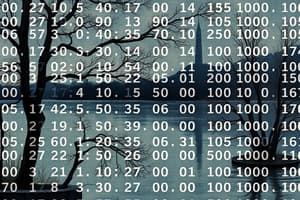Podcast
Questions and Answers
Decimal to binary 125 to binary 2 125 ⇒ ______
Decimal to binary 125 to binary 2 125 ⇒ ______
1011101
Binary to decimal ==> 1 * 2^0 + 0 * 2^1 + 1 * 2^2 + 1 * 2^3 + 1 * 2^4 + 12^5 + 12^6 + 0 *2^7 ==> ______
Binary to decimal ==> 1 * 2^0 + 0 * 2^1 + 1 * 2^2 + 1 * 2^3 + 1 * 2^4 + 12^5 + 12^6 + 0 *2^7 ==> ______
125
Decimal to octal 212 to octal ===> ______
Decimal to octal 212 to octal ===> ______
324
Decimal to hexadecimal 472 to hexadecimal ==> ______
Decimal to hexadecimal 472 to hexadecimal ==> ______
Hexadecimal to binary : The maximum value of hexa is F which is 15, so to represent 15 4 bits are required. Therefore whenever hexa is to be converted to binary then each digit should be converted to 4bit binary value like below: ______
Hexadecimal to binary : The maximum value of hexa is F which is 15, so to represent 15 4 bits are required. Therefore whenever hexa is to be converted to binary then each digit should be converted to 4bit binary value like below: ______
Binary (Base 2, ______)
Binary (Base 2, ______)
Octal (Base 8, ______)
Octal (Base 8, ______)
Hexadecimal (Base 16, ______)
Hexadecimal (Base 16, ______)
number = 125, then binary will be Decimal to binary 125 to binary 2 125 ⇒
number = 125, then binary will be Decimal to binary 125 to binary 2 125 ⇒
Binary to decimal ==\gt; 1 * 2^0 + 0 * 2^1 + 1 * 2^2 + 1 * 2^3 + 1 * 2^4 + 12^5 + 12^6 + 0 *2^7 ==\gt;
Binary to decimal ==\gt; 1 * 2^0 + 0 * 2^1 + 1 * 2^2 + 1 * 2^3 + 1 * 2^4 + 12^5 + 12^6 + 0 *2^7 ==\gt;
Flashcards are hidden until you start studying




